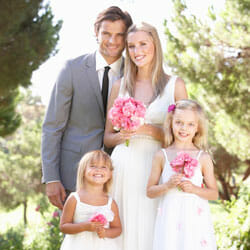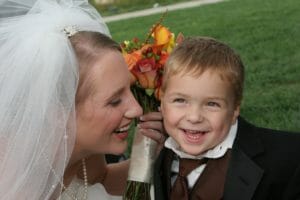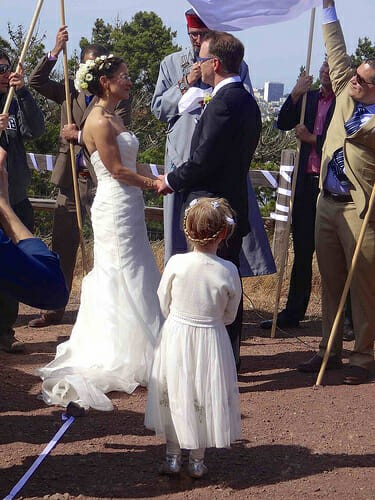 I believe it is very important if children are coming into the marriage that they be recognized or participate in some part of the wedding ceremony itself.
I believe it is very important if children are coming into the marriage that they be recognized or participate in some part of the wedding ceremony itself.
Children often can not express fears or doubts they have. Involving children in the ceremony helps them to transition to the new relationship in which they are now a part.
Many times it takes time for your child to work your request through their feelings. What may be a clear turn down today may be an enthusiastic ‘sure’ a few weeks from now. Give them time, you won’t regret it.
Mention The Children In The Wedding Ceremony
I think it is much more important for children hear their names mentioned in the ceremony than it is for them to play any major part of the ceremony. Mentioning a child’s name during the wedding assures that they are an important part of the occasion and have special status which guests and other family members attending do not. At this special time, children need to feel important to their parents. Keep in mind that with this ceremony, a new family is being born. This is especially important to young ones. When children are coming into the marriage, it is appropriate to mention in the ceremony that not only is a marriage being formed, but also a family – and then we name each child. If a prayer is in the ceremony, each child’s name can be stated in the prayer.
Watch Out For The “I Feel Rejected” Syndrome Immediately After The Ceremony
Where children tend to be left out is immediately after the ceremony. The bride and groom walk away and are crowded by “big people” – with the children left out of the immediate post ceremony celebration. Remember most children do not know what they are supposed to do after the ceremony ends. This is easily avoided. The couple should simply take a moment to hug their child/children, thank them for helping in the ceremony, and then telling them they are free to play etc. This time of quality recognition is very important.
Be Careful With The Excessive Involvement Of Children In The Marriage Ceremony
 Surprise! Once in a while children will not share your sense of excitement about the wedding. Often, to the child it can seem more a party occasion. Usually, giving children major roles in the ceremony quickly becomes a duty rather than a delight. It is generally best to give a child only one active role and also to be mentioned in the ceremony, rather than to actively involve a child at too many different points throughout the ceremony. With teenagers, some care should be taken not to give them roles they may feel silly doing.
Surprise! Once in a while children will not share your sense of excitement about the wedding. Often, to the child it can seem more a party occasion. Usually, giving children major roles in the ceremony quickly becomes a duty rather than a delight. It is generally best to give a child only one active role and also to be mentioned in the ceremony, rather than to actively involve a child at too many different points throughout the ceremony. With teenagers, some care should be taken not to give them roles they may feel silly doing.
Keep It Simple
For younger children, usually the simple task of holding the rings or bouquet is enough to accomplish a sense of participation. For teenagers, the role may be as simple as standing up with the couple, playing the CD or tape of wedding music, or even just taking pictures of the ceremony with a one time camera. In short, try to find a non-ceremony role for the child. Often if presenting roses are a part of the ceremony the couple will have a rose for each of the children. After exchanging roses, the couple will then give each child a rose, a hug, and whisper “I love you.” Typically, couples may give children a gift right after they exchange their own rings and vows – usually a necklace, medallion, or ring – along with a hug and an “I love you.” You can use the family unity candle or family sand ceremony. The family Unity Candle ceremony can be done many ways. If the children are small, the bride and groom light small candles for each of the children – and then they light the center candle together. If the children are older, each child can have a candle to light. Then all light the center candle together. The family sand ceremony has the couple pouring sand in the center container as a foundation for the family. Then the children add their sands. Once again, the couple end the ceremony with the pouring of their sands to seal the family unit. Either of these ceremonies are a great way to include children.
Flower Girls And Ring Bearers
Generally speaking, flower girls and ring bearers are between three and seven years of age. Of course, the younger they are, the more unpredictable their behavior will be. If the child is old enough to walk up the aisle and be relatively well behaved then they are old enough. It really depends on the personality of the child. On many occasions, I seen small children perform beautifully in the rehearsal but become terrified when all the guests are present and simply refuse to walk down the aisle. Only the parent can judge if the child is ready to take on a role of flower girl or ring bearer.
The Older Children
Children eager to participate in the wedding ceremony can be bridesmaids and ushers as well as honor attendants (the new unisex term for the maid of honor and best man); the roles they can play are no longer limited. An eleven-year-old son can be a best man. A nine-year-old girl can be a maid of honor. A bride’s son can be her “honor attendant,” as a groom’s daughter can be his. A bride’s son, daughter, or both can escort her up the aisle and “give her away.” You may even choose to have your wedding party made up entirely of your own children.




